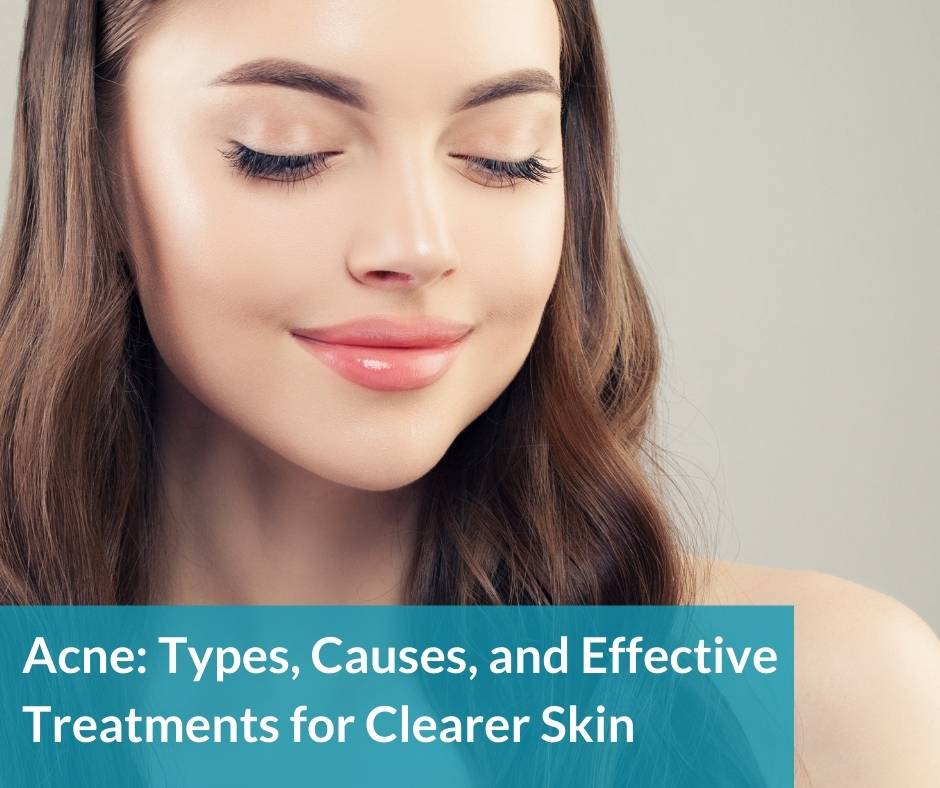Acne: Types, Causes, and Effective Treatments for Clearer SkinAcne affects around 20% of Canadians (5.6 million), according to the Canadian Dermatology Association. People tend to develop this condition between the ages of 12 and 24, though it may occur at any stage of life. It usually forms on the face, though it’s common on the back, chest, and shoulders too. Acne can be a painful, severe, and stubborn condition, but various treatments are available. It may lead to scarring in some cases, but this can be treated too. However, trying to find the right treatment for your skin can be difficult — but the Astra Medicare team is dedicated to helping you make the best choice. Join us as we take a look at what causes acne, the different types, how you can treat acne, and how to deal with scarring safely. What Causes Acne?Acne occurs when hair follicles or pores become clogged by a combination of dead skin cells and sebum, a natural oil produced by the sebaceous glands. This oil moisturizes the skin to prevent it from becoming too dry, but it can build up over time. As a result, dead skin cells will clog together inside tiny openings in the skin. The following can also contribute to the development of acne:
The latter cause is one of the main reasons why acne is closely linked with teenagers, as hormones fluctuate throughout this period. What are the Different Types of Acne?There are two main types of acne: inflammatory and non-inflammatory. Doctors and dermatologists will distinguish one from the other based on how inflamed the breakouts appear. Both types of acne can involve:
The most severe cases of acne usually involve cysts and nodules. Inflammatory AcneInflammatory acne occurs when follicles or pores are clogged with bacteria and develop into papules, pustules, or cysts. The immune system targets the bacteria and tries to destroy it, which is why skin in the affected area(s) becomes swollen and red. The severity of inflammatory acne varies from tiny bumps to substantial cysts that may only be removed through surgery. It’s the more severe of the two types, and may lead to pitting or scarring. Non-inflammatory AcneNon-inflammatory acne refers to clogged follicles or pores that become infected by bacteria. This leads to the formation of blackheads and whiteheads. However, non-inflammatory acne generally won’t cause discomfort or swelling. What Creates Acne Scarring and How Can You Avoid It?Acne can create brown or red marks on the skin, while more severe cases may lead to permanent scarring when nodules or cysts pop and the affected tissue is destroyed. Scars will remain visible even when the skin heals. However, you may create acne scars if you squeeze or pick at your spots. It can be difficult to resist the urge to do so, especially when acne becomes painful, but popping pimples may leave an undesirable trace in your skin for decades. You may cover them up with make-up (such as foundation), or you might opt for treatment to reduce the visibility of scars on your face instead. What Treatments are Available for Acne and Acne Scarring?You can try various facial treatments to help fight acne and improve the appearance of acne scarring. People often try the following to combat inflammatory and non-inflammatory acne:
Four of the treatments available at Astra Medicare are: The Perfect Derma PeelThe Perfect Derma Peel is a popular treatment for acne scarring. This chemical peel is packed with powerful ingredients including:
The Perfect Derma Peel can be customized to suit each patient’s personal needs. Clear + BrilliantClear + Brilliant can improve the appearance of tissue affected by acne and make scarring less visible. This is a skin treatment effective enough to combat common signs of aging, either after or before they appear. The laser forms microscopic treatment zones in the skin’s upper layers, and encourages healthy tissue to replace damaged skin. Clear + Brilliant This treatment is administered through multiple sessions lasting between 15 and 20 minutes each (on average). It can make skin look healthier and more youthful. Glutathione IV TreatmentOur Glutathione IV treatment injects glutathione directly into the bloodstream. Glutathione is a natural antioxidant that manages production of melanin, which creates the skin’s pigment. A glutathione boost can promote brighter skin, and areas affected by acne scarring should look healthier overall. Purifying Acne FacialAstra Medicare’s Purifying Acne Facial is ideal for acne-prone skin. It helps bring impurities to the surface of the skin to allow for easier removal. Our specialists only use products designed for sensitive skin, all containing natural, anti-acne ingredients. This facial can cultivate a clear complexion and fight against acne that proves particularly stubborn. How Can You Book Your Consultation for Acne Treatment?The Perfect Derma Peel, Clear + Brilliant, the Purifying Acne Facial, and Glutathione IV treatments are available at Astra Medicare today. Any of these will help acne and acne scarring in specific ways, but should all leave your skin looking better than ever. Our professional team will examine your skin and discuss your needs in detail during a free consultation. This is a valuable opportunity to understand how we can help your acne, how we can treat scarring, and how we can make your skin look younger. We can also recommend other facial treatments to improve the health and appearance of your skin, even after your acne subsides. Contact Astra Medicare now to schedule your consultation and discover the right treatment for your acne.
0 Comments
Your comment will be posted after it is approved.
Leave a Reply. |
AuthorDedicated and passionate Astra Medicare staff. Archives
June 2024
Categories
All
|


 RSS Feed
RSS Feed